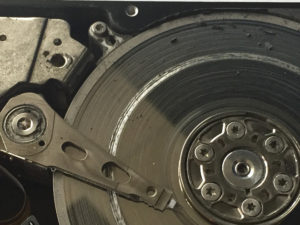Before attempting data recovery, engineers must evaluate each case to determine the cause (and extent) of data loss. While flat-rate data recovery exists, reputable providers insist on evaluations — in another article, we explained what happens during a data recovery media evaluation and why it’s important.
After receiving your quote, you’ll probably have questions. Here’s what to ask (and what to expect throughout the rest of the process).
1. “What do I pay if the data is unrecoverable?”
Reputable data recovery companies offer some sort of guarantee: If your files aren’t recoverable, you won’t pay (or you’ll pay an “attempt fee” that is much lower than the quoted price).

A hard drive with severe platter damage.
Find out whether you’ll pay for a failed attempt. If so, make sure that the attempt fee or evaluation fee is reasonable. For a standard hard drive or solid-state drive (SSD) recovery, a $50 fee is defensible, but a $500 attempt fee is not.
Complex cases may require larger attempt fees. For example, if you’re recovering data from a web server with a dozen hard drives, the engineers will need to spend hours cloning the media before the attempt begins; in that case, an attempt fee makes sense.
At Datarecovery.com, we provide a no data, no charge guarantee on standard cases: If the files you request are not recoverable, we don’t charge for the attempt — period.
Related: The Problem With Flat-Rate Hard Drive Data Recovery
2. “How will you return the data to me?”
Data recovery companies may return your data through cloud services, on external hard drives, on flash disks, or via another method. Find out how you’ll receive the data — and determine whether you’ll pay extra for certain return methods.
If you need the data in a specific format, this is a good time to tell the engineers. For example, if you’re recovering data from a Mac OS X computer, but you’re planning on restoring the data to a Windows computer, the data may need to be converted (and data conversion may carry a moderate cost).
Related: Data Conversion Services
3. “What caused the data loss, and what are the chances of a successful recovery?”

A Datarecovery.com laboratory.
When you respond to a data recovery quote, you’re probably speaking with a customer service representative. Your contact may have limited information about the nature of the failure — but they should be able to give you a decent overview of what happened to your device.
If your provider gave you an estimated chance of recovery, ask how this was determined. Datarecovery.com estimates recovery probability by inspecting hardware for obvious signs of physical damage and by comparing the failure to past cases.
Related: 7 Data Recovery Myths, Busted: Understanding Data Loss
4. “What are your service options?”
Most data recovery companies offer several different “priority” levels. Your service level will not affect the chances of a successful recovery — at least, not if you’re working with a reputable provider — but it will affect the turnaround time.
Of course, if turnaround time isn’t a priority, you should request the slowest service option. If you need the data quickly, you may be able to restore the lost files in as little as 24 hours. Just remember: You’re jumping the line, but some data recovery procedures take time.
If your case is taking longer than expected, it’s okay to ask for updates from the engineer. But be as patient as possible: The team’s goal is to fully restore your data as quickly as possible.
When turnaround time is a concern, it’s a good idea to ask about technology. Datarecovery.com operates full-service laboratories at every location — we invest heavily in research & development, which enables our engineers to treat every case onsite (without transferring media to a central laboratory).
To learn more about our services, call 1-800-237-4200 or submit a case online.





